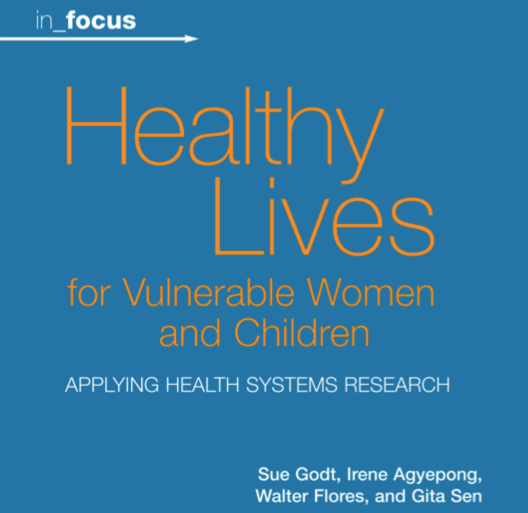Healthy Lives for Vulnerable Women and Children: Applying Health Systems Research
This book draws on 15 years of IDRC-funded health systems research undertaken by researchers working closely with communities and decision-makers. They have generated contextually relevant evidence at local, national, regional, and global levels to tackle these entrenched health systems challenges.
The quality of data collection and health information systems can be sustainably strengthened by undertaking health systems research with relevant health structures. In India, new national guidelines for maternal death reviews were introduced based on evidence demonstrating that existing reviews obscured the systemic neglect of women’s health needs in pregnancy and childbirth and the tendency of health professionals to mask their own failures. Two Nigerian state governments institutionalized evidence-based decision-making by establishing innovative realtime community surveillance systems through which health workers visited every household and transmitted ‘live’ data to the ministry planning departments. These two examples ‘counted’ vulnerable women who were often invisible to the system and facilitated planning that responded to their health needs. Importantly,
the data was taken back in appropriate formats to those responsible for driving change: facility performance scorecards for health planners, improved diagnostic tools, and engagement platforms for health workers, docudramas, and discussion groups for communities. Health systems researchers advanced efforts to implement the ambitious SDG goal around Universal Health Coverage (UHC).
Their evidence documented the long-term impoverishing impact of health fees on poor households as well as the challenges confronting governments trying to mitigate the suffering by applying partial and fragmented subsidies. Researchers have developed relevant analytical tools and guides to support governments in planning UHC implementation. Evidence is showing how putting vulnerable women and adolescents at the centre of UHC processes can strengthen the overall system. Significantly, the research has demonstrated that UHC is not a technical issue; adopting UHC is a political decision requiring social solidarity
about the value of providing care to vulnerable populations. Ultimately, accountability, governance, and stewardship of health resources are needed to ensure strategic and consistent decisionmaking and resource allocation to build strong health systems. The evidence has shown that this governance is needed – and makes a difference – from local to national to global levels.
Health systems researchers and stakeholders in Guatemala and Uganda for example worked with vulnerable communities to monitor and report on quality of service delivery and to negotiate improvements to maternal health facilities. In East, Central, and Southern Africa, researchers worked with authorities to strengthen
governance at scale, both nationally and regionally. Their research also documented systemic global factors negatively influencing efforts to improve health services, including reproductive, maternal, and child health services. Strategically, they also identified opportunities for South-South collaboration to address these global-level factors.
To ensure that evidence is used to drive change, researchers are building relationships of trust and respect with decision-makers, practitioners, and communities as well as creating platforms of engagement that facilitate frank debate and deepened discourse around the evidence in ways that have influenced policy and practice at local, national, and global levels.
You can read the book by using this link.
